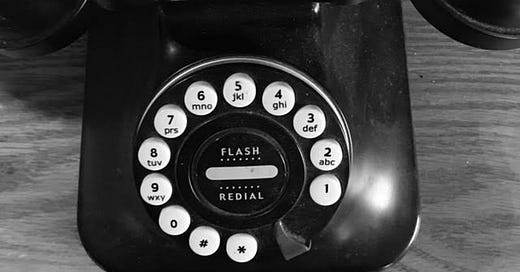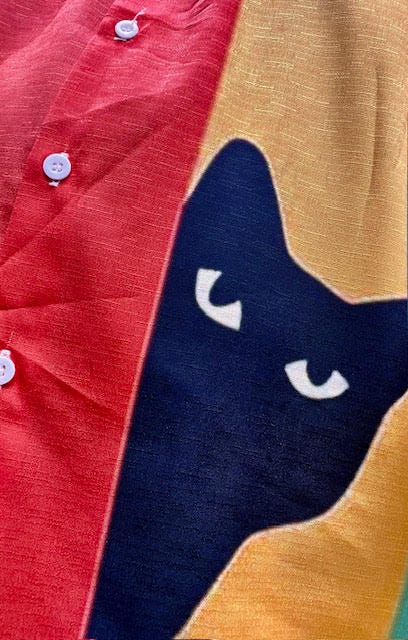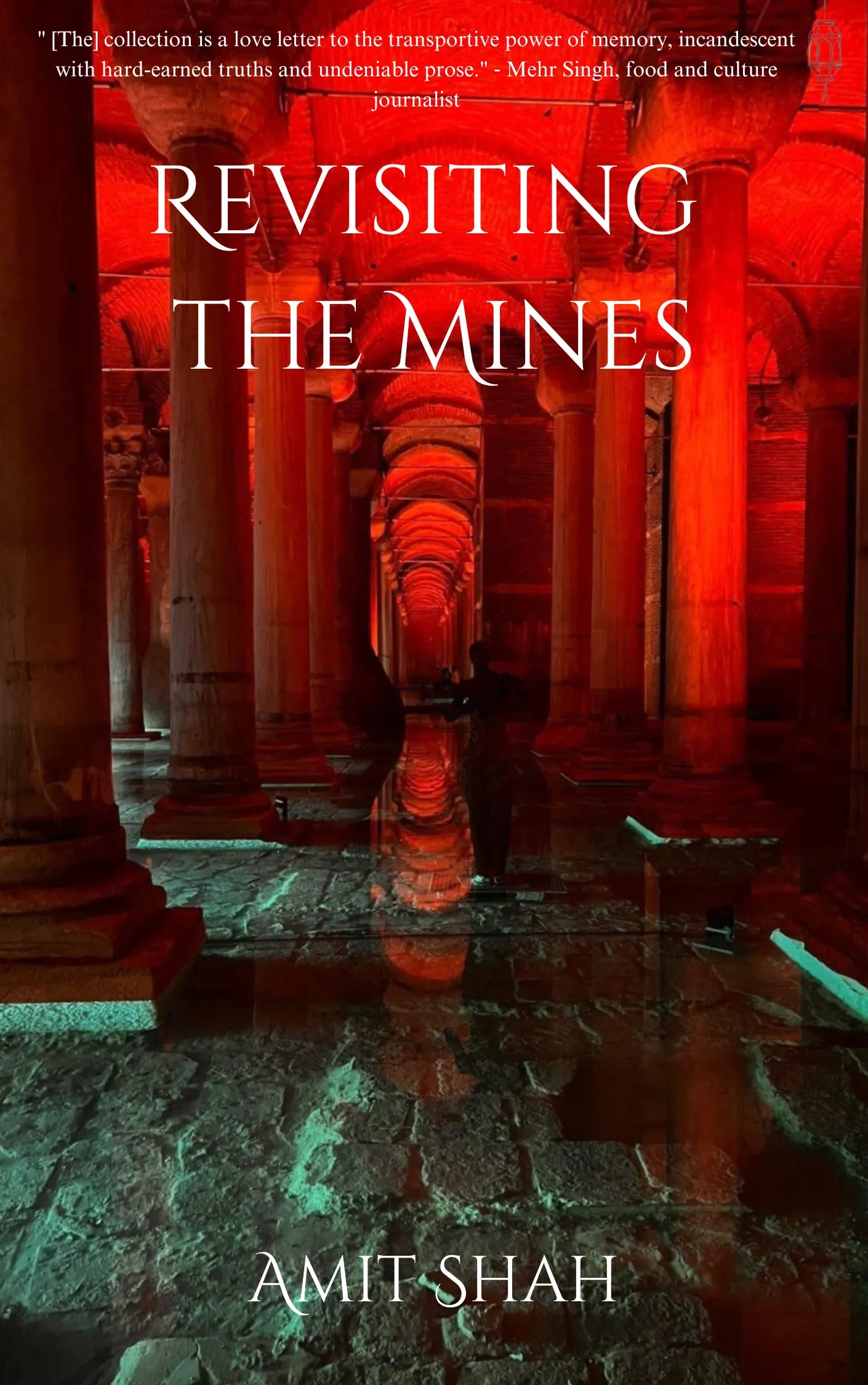Chowks, Rotaries, Roundabouts
“. . .placed my grief in the mouth of language. . .” (~ Lisel Mueller, “When I am Asked”)
(All photographs courtesy of author. All Rights Reserved)
Every day, I let my mind go for a walk. Usually when I’m physically taking a walk, three to four miles around a reservoir. In today’s wanderings, I realized that I didn’t remember talking to my parents on the phone, except for a few times with my mother, just before she passed away. In recollection, it didn’t surprise me. Having grown up in the ‘50s and ‘60s, using a landline telephone in India was not a national pastime.
We did have a rotary-dial black telephone at home, which was ostensibly for my father’s work. My mother rarely used it. I don’t remember my sister clinging to it in her teen years (I think she simply went elsewhere). I, on the other hand, hogged it for a few years and talked incessantly with my friends and my sister’s friends (some of whom indulged me since they were four years older than me).
After I went away to college at seventeen, I rarely tried to use the phone. There was one in front of the bursar’s office, and it ate coins as if it were manufactured to do so. The other place where I remember a phone was the post office, where you stood in line to make a long-distance call. The “trunkline “operator would take your information and then hours later, call you back. I never used it. Telecommunications in India was prehistoric then. Young people in India probably don’t realize that India leapt across a couple of generations of technology when they got digital cellphones. In the mid- ‘90s, in Kolkata, there was office help whose sole job was to dial and redial numbers to get a connection. Couriers were faster.
I’d moved to the US in early 1971 and for the next two decades, I called my parents in India maybe twice. The cost of international long-distance calls and the wait times for operator-assisted calls made the exercise an emergency-only event.
**************
I have a trip planned. To cities turned to rubble and rebuilt, achingly and carefully over a few decades. Dresden and Berlin, and to a smaller degree, Prague. We don’t have to imagine the destruction and suffering. It’s happening in our world as I tap the keyboard. In Gaza, Khan Younis, Rafah.
Kurt Vonnegut, who survived the firestorm of Dresden by hiding in a meat locker, wrote a novel that forced a generation to confront the cursedness of war.
“- Why me?
- That is a very Earthling question to ask, Mr. Pilgrim. Why you? Why us for that matter? Why anything? Because this moment simply is. Have you ever seen bugs trapped in amber?
- Yes.
- Well, here we are, Mr. Pilgrim, trapped in the amber of this moment. There is no why.”
(~ Kurt Vonnegut Jr., Slaughterhouse-Five)
*************
I am a tourist in calmer times. On a Sunday in Florence. Standing atop the Arno, waiting for the Galileo museum to open. The quiet breached by the soft crunch, a rare car tire, the chirp of birds, the bells out of a bell tower. And later, after two cups of coffee and a walk in a slight, misty drizzle on cobbled alleys to the epicenter of Renaissance art---the sculptures at the Borgello and the masters whose medium was marble, the hallmark of Renaissance aesthetics.
A coffee shop off Commercial Street, overlooking Cape Cod Bay in Provincetown. In the Baedeker’s of my travel plans, this would be a “failure.” I stumbled onto the coffee shop, after searching awhile for art museums and historic sites in nearby towns, only to find that they were yet to open for the season. So, I walk and see what’s around me.
“Failure” would be the lack of finding a predetermined destination. Without that “discovery” is sublime. Most of my life has been spent sprinting toward a destination. “Discovery” in my septuagenarian years is an unanticipated gift.
*********
Memories aren’t warehouses of finished stories but a gallery of snapshots. Wish I had said it, but I think it was Patricia Hampl. Bad notetaking is definitely one of my regrets.
· I remember I taunted a girl on a playground when I was 6, I think. She bit me on my cheek, just underneath my left eye. The scar is a reminder.
· I remember I played marbles like a pro gambler when I was in kindergarten. I can almost feel the exhilaration. It’s simply a memory.
· I remember I fought with my mother over the width of my trouser cuffs in 1963. I was 13 and they had to be 11 inches.
· I remember that I thought “maths” (the British pronunciation) was “mats” and I was confused. I heard my sister was doing “mats” at school. I was 4.
_________________________
COMING SOON (September)
Published by Paper Lantern Books, India
Prepublication Reviews
“Amit’s writing comes from a space within that has an immense capacity to capture beauty in multiples. Descriptions of trees collide with yearning for friends, lives and cities past with today, and yet each stands out with a strange evocative intensity. It’s a beautiful read, the one you’ll carry outdoors on a warm but breezy summer day.”
(~Sohini Chattopadhyay, Assistant Professor of History, Union College, NY)
“At a time where everything is quick and easy, Revisiting the Mines is a slow and deliberate look at the world and the rich tapestry of life. The book's breadth is vast, encompassing engaging anecdotes from Shah's long career in publishing, the interplay of his family's and the country's history, as well as rich observations from his daily walks. It's a book I enjoyed dipping into at the end of each day, it infused in me a certain calmness.”
(~Veena Venugopal, author, India)








Very interesting and well written!
Thanks for sharing.
I remember the lack of phones in India, and the impossibility of calling India from the US,